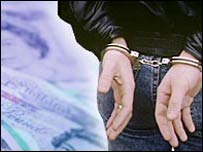

How to report a crime & make a citizen’s arrest
1. Why should you report a crime?
2. Ways of reporting a crime
3. What information is needed?
4. Can I make a citizen’s arrest?
5. Feedback and comments
1. Why should you report a crime?
All crimes that you witness should be reported to the police, no matter how insignificant you think they are.
Only a small percentage of all crimes are ever reported to the police, but reporting a crime is not just about statistics for the police. It helps them to evaluate services in your area and decide what is needed to help sort out the situation.
More importantly, reporting a crime could give the police essential information they need to help them solve that crime.
Crimes should be reported as soon as possible and you don’t necessarily have to give your name. You can do it anonymously.
2. Ways of reporting a crime
999 is for use when an ‘immediate’ response is required and should only be used in cases where a crime is still in progress or if anyone is in immediate danger. You should not intervene if the crime involves any violence. Instead call 999 immediately.
When making a call to 999 you will be put through to an operator who will ask you which service you require: police, fire or ambulance. Once you have been connected, the police will want to know four things:
* Where exactly are the police required?
* Why do you want the police?
* What is your name?
* What is the number of the phone you are calling from?
The emergency services receive thousands of hoax and non-emergency calls every year. This affects their response time to situations, so it’s important to consider whether your call is appropriate.

A non-emergency is where the crime has already occurred and covers things like theft and criminal damage.
In such situations you should contact your local police station, or you can use their online reporting service.
It’s a good idea to have your local police station number easily available. You could either put it into you mobile phone, or keep it on the fridge or pin board. Some police forces have launched a non-emergency reporting number.
3. What information is needed?
When you report a crime there are certain things that you should try to remember – but the fact that you’re reporting the crime is the most important thing of all. By their own admission the police would rather you gave them the wrong information than none at all.
Think about suspects' distinguishing features.
Here are some things to think about that may be very useful to the police. Try to find a piece of paper and write down what you saw as soon as possible. If there was anyone else around who saw what happened then encourage them to report what they saw too. Try to get them to give you a name and address so the police can contact them.
Things to think about at a crime scene include:
* Time and date of incident
* Place
* How many suspects did you see?
* What were they doing?
* Did they say anything?
* Which direction did they head towards?
* Did you see any other witnesses?
* Any other information you can think of
When describing a suspect think about:
* Approximate age
* Sex
* Race
* Height
* Any distinguishing features? (Tattoos, scars etc)
* Build
* Eye colour/shape
* Hair colour/style
* Accent
* Complexion
* Facial hair
* Clothing
* Any other information
If there was a vehicle, include:
* Registration number
* Make and model
* Colour
* Dents, scratches, etc
If your information leads to an arrest you could be asked to be a witness in court.
4. Can I make a citizen’s arrest?
Arrests can be made by people other than the police but should be approached with caution as legally it is a tricky area and potentially dangerous. The police do not actively encourage people to make citizen’s arrests and the circumstances of the arrest can be examined in detail if the case goes to court.
The right to make a citizen’s arrest comes under section 3(1) of the Criminal Law Act 1967 which says:
"A person may use such force as is reasonable in the circumstances in the prevention of crime, or in effecting or assisting in the lawful arrest of offenders or suspected offenders or of persons unlawfully at large."
The crime must be a ‘serious offence’, i.e. one which could potentially result in a prison sentence of five years or more. So drink-driving would not qualify as it has a maximum prison sentence of six months but stealing would because it can result in a long prison sentence.
You can make an arrest if:
* You see someone committing a ‘serious offence’
* You are certain that someone has already committed a ‘serious offence’
For the arrest to be completed you need to inform the person that they are under arrest and restrain them – you don’t have to physically restrain them but they must be under your control. If you tell someone that they are under arrest and they run away then the arrest has not been completed.
However, if you arrest a person who is later judged by the police or the courts not to have committed a ‘serious offence’ then your arrest is unlawful.
If you have made an arrest using ‘reasonable force’ but the arrest is later judged to be unlawful then criminal charges can be brought against you. If you seriously injure the person being arrested then they can bring criminal charges against you regardless of the outcome of the arrest.
As soon as you have made an arrest you must alert the police. Then you must either hand the arrested person over to a policeman in the street or take them to a police station as soon as possible.
However, the most important thing to consider when deciding whether to make a citizen’s arrest is your own safety. If you are in any doubt then you should not put yourself at risk.




No comments:
Post a Comment